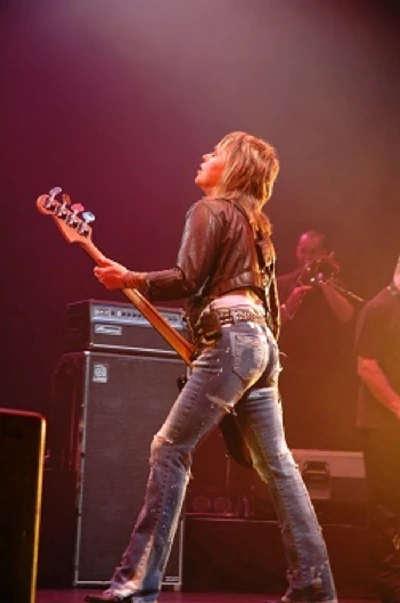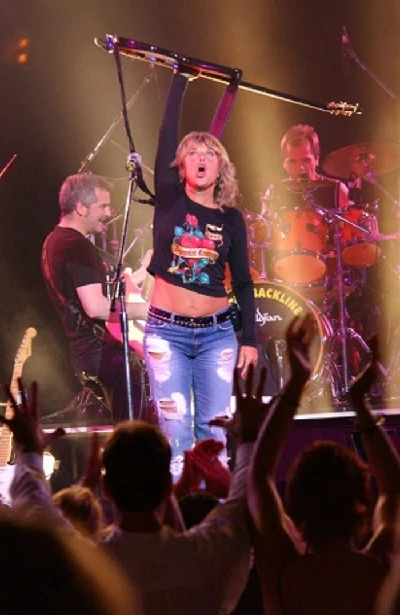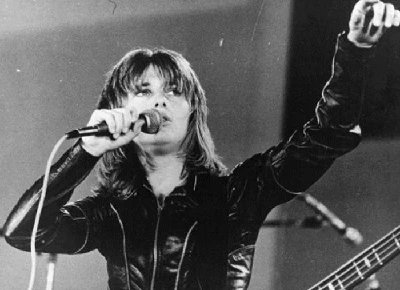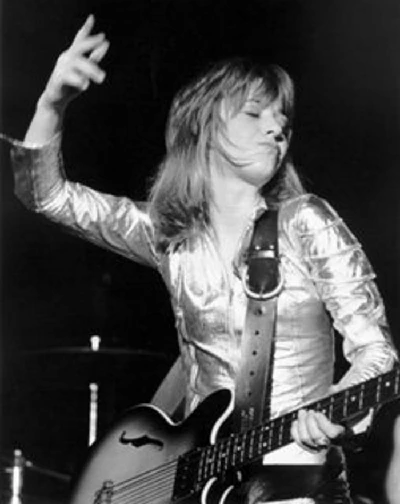published: 13 /
3 /
2012
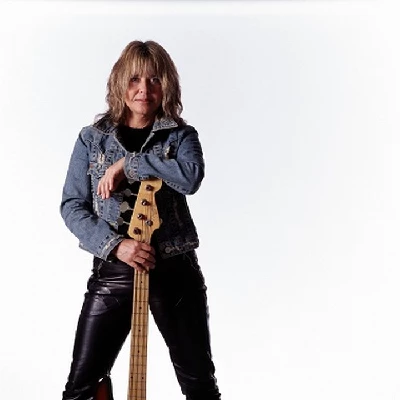
Lisa Torem speaks to influential Detroit-born guitarist Suzi Quatro about her forty year musical career, autobiography 'Unzipped' and the glam rock years
Article
Suzi Quatro’s formative years, outside of Detroit, in Gross Pointe, Michigan, revolved around her awe of all things musical. The second youngest of five, and a quick study, she excitedly played ‘Mack the Knife’ on her bandleader father’s bongos and in 1967, after seeing the Beatles on ‘The Ed Sullivan Show’, formed an all-girl band, the Pleasure Seekers, which included siblings and neighborhood friends.
Patti Quatro played lead guitar and Suzi the bass guitar, and they and the group’s other guitarist Mary Lou Ball were eventually joined after various line-up changes by Patti and Suzi’s sisters Arlene on piano and Darline on drums. Back in 1967, it was generally unheard of for a young female musician to play the bass, but Suzi, who had received a 1957 Fender Precision, as a present from her dad, took to the task seriously.
The fact that this model had an unusually wide neck; one which would be technically challenging and even painful to play, didn’t phase Susie Kay Quatro one iota. It only motivated her to work harder. One of her mentors, James Jamerson, the Motown studio bass player, offered her some tips, which helped, but it was her unarguable stage charisma, drive and dedication to mastering the instrument that would propel her career.
After some line-up changes, the new band was renamed Cradle and the girls began writing original music. Their new sound would deviate from soul and morph into rock. As word spread, they would share the stage with other Detroit artists like Mitch Ryder and the Detroit Wheels, the Knack and Alice Cooper.
In 1971 British producer and RAK Records owner, Mickie Most caught their act. At the same time, Jac Holzman of Elektra Records also recognized Quatro’s talents and both record labels offered her record contracts. Ultimately the ambitious entertainer would grow more intrigued by Most’s (Donovan, The Animals) offer, even though his roster was saturated with British male bands. Most appreciated Suzi Quatro’s authenticism, while Holstrum mentioned that he would turn her into the next Janis Joplin.
But Most’s record deal would require Suzi to leave the US and her close family unit to spend the next few years in England. At the age of 21, in a foreign country, she would suffer from homesickness and a few false starts until she and Most agreed on how to best market her image and create a repertoire that would showcase her gutsy vocals and powerful licks.
Little by little, her tough, leather-clad image began to take shape. Early hits included 1973’s riff-heavy ‘Can the Can’ and 1974’s‘Devil Gate Drive’.
Her professional relationship with Mike Chapman, half of the then songwriting duo, Chinn/Chapman. would be hugely successful. She would enjoy the budding Glam Rock Movement, and would record the 1978 duet, with Chris Norman, ‘Stumblin’ In’.
Consistently undisturbed by challenges, Quatro would go on to play the role of Leather Tuscadero in the popular American show, ‘Happy Days’, in the late 1970s; would appear in musicals and gain a new audience through her career as a radio show host.
In addition last year Suzi embarked on another album project with Chapman, as producer: ‘In the Spotlight’. The project drew acclaim from critics who said it brought Suzi back to her roots.
In 2007, she published ‘Unzipped’ in which she candidly discussed her first marriage to guitarist Len Tuckey; her current life in Essex; her second marriage to promoter Rainer Haas and the colour and drama of her decades-long career as a groundbreaking rocker who has inspired a multitude of other female pioneers, including Joan Jett.
PB: You and your sisters pooled your talents when you formed the Pleasure Seekers. Your brother, Michael, was also a musician, as was your father, Art. Many kids pick up bass by default, and you probably had your choice of instruments back then, in the ever-musical Quatro household. What were those early years like?
SQ: I learned classical piano and percussion; self-taught bass.
PB: What drew you to the bass, when a guitar or ukulele would have been an easier choice for a vocalist?
SQ: I am not a normal girl…”tomboy”, if you like!! I played bongos first at age seven, and then I learned piano and percussion at school, and then I formed my first rock band at the age of fourteen.
Everyone chose an instrument, nobody chose bass. It was given to me. When I was young, I used to put rubber bands across the back of a chair and pretend I was playing stand up bass. It’s in my blood.
PB: What is your advice for playing complicated rhythmic bass lines while singing rock?
SQ: I never thought about it, so maybe that is the secret. Everything I do is two-handed. I started to write with my left, but my teacher made me use my right hand.
I play baseball and golf, left-handed. I type like the wind. I am able to multi-think musically. Always could. Therefore, singing lead and playing bass was never any problem.
PB: Who are your favourite bass players from then and now?
SQ: Jamerson, from Motown, first and foremost. Second, Carol Kaye, who was again on Motown, and then the bassist with Canned Heat…that was the first time I ever saw a proper bass solo.
PB: In your autobiography, ‘Unzipped’, you mentioned that there was a burgeoning music scene in Detroit born of desperation: a ‘gotta get out of this place’ feeling. What did you mean by that?
SQ: Detroit is a survivor city. We are proud to come from there and also proud to survive and exist elsewhere. It is a city of extremes: rich, poor, black, white, energy, lethargy. In a way I have never left that city.
PB: How real was the tough girl image you have portrayed onstage and in photos?
SQ: Suzi Quatro is real. Otherwise it would not have worked for so long, but there are two sides. That is why I wrote my autobiography in two people. Both are necessary for my survival.
PB: Has there always been a tug-of-war between the street-wise youngster from a family of five kids, and the onstage rocker?
SQ: The child in me is such an important part. It balances the famous one. One cannot exist without the other, and this is also the reason why I am normal and approachable.
PB: You were a pioneer in a male-dominated industry, and when playing those early venues, men in the audience subjected you to a lot of vulgar behaviours, according to ‘Unzipped’
SQ: There were maybe a few instances, but basically I took myself seriously, and therefore so did everyone else. I am not a gender person. I do what I like, when I like, how I like and damned be anyone who stands in my way.
PB: But how did you keep going despite that?
SQ: I will always keep going, even though I am thin skinned. I will walk through the fire. Nobody stops me from going where I intend to go.
PB: You have said that your 1979 album, ‘Suzi …and Other Four Letter Words’, which includes ‘She’s in Love with You,’ ‘Mama’s Boy’ and ‘I’ve Never Been in Love’ is one of your favourites. What made this one stand out in your mind?
SQ: I was in a great space for writing, maybe the best ever. The next album that was great writing for me was, ‘Back to the Drive’ in 2006. Both represent a splurge of creativity.
PB: I have some questions about your fifteenth studio album, ‘In the Spotlight’. Mike Chapman joins you again for this recording project. How did you work out the parameters this time around?
SQ: Mike wanted to reclaim my legacy. He says on the album, ‘Every girl who came along in the last 40 years owes something to me…the original.’ He had a vision about this album. He wanted control (tongue-in-cheek) and got it. I respect him. He respects me. We have had a lot of success together.
PB: More specifically, the first tune, ‘A Girl Like Me’, highlights both your upper and lower register and it sounds like it was recorded in a tunnel. It has a unique sound quality.
What was the technology behind it?
SQ: We recorded live in the studio, my insistence; young musicians, hands on. This is what you are hearing, plus I am singing in the “best” of my vocal range.
PB: ‘Rosie Rose’ is another Chapman rocker that really takes us back. How did you and Mike know when you had exactly the right take?
SQ: I went to Connecticut and did the vocal and bass. Mike called about a month later and said it’s not right. Something was not happening, so I listened again, literally “dove” into the song, went back to Connecticut, stood in front of the microphone and laid it down in one take! Magic. (It was a question of attitude.)
PB: On that same album, one of your originals ‘Hurt With You’ has these lyrics: “Time to tear some fences down/It’s time to turn your heart around/ Reach out down and grab what’s trapped inside/Don’t let it die/ I don’t mean to make you cry…”Even after forty years of songwriting, your lyrics have not lost that bite. What sustains you as a writer?
SQ: This was written about a very good friend of mine who runs my official website. I’ve known him since the age of fourteen. I always write about truth, never fiction. People touch me and I hope I do the same back.
PB: One of the cover songs is Goldfrapp’s ‘Strict Machine.’ Another is Rhianna’s ‘Breaking Dishes.’ Your original ‘Hurt With You’ has a reggae beat, but the album really spans the genres, from pop to rock to country. Was that the original focus?
SQ: I guess it was to capture the original Suzi Quatro and to put her into today’s market. I think we were successful in this. If you listen to the early stuff, we did cover all the genres. I am a very musical person, starting with my dad’s music all the way through three siblings, to my music and my little sisters.
PB: ‘Singing with Angels’, the bonus track on ‘In the Spotlight’, is like a patchwork quilt of Elvis Presley memories. You enlisted the Jordanaires and guitarist James Burton, who both worked closely with Elvis. What was it like performing with these musicians?
SQ: I was so thrilled. If you read my book, you can find the whole story. There are so many connections. This was the culmination of a lifetime. There I was with Elvis’s guitarist, Elvis’s backing vocalists, in his studio, doing my tribute, high as a kite, absolutely.
PB: So they were able to capture the sound you were seeking? 100%?
SQ: It gives me chills every time I hear it.
PB: Do you have any regrets about declining the King’s invitation to meet up in your early years?
SQ: No, everything happens for a reason. If I had met him, I would not have written this song, and this song ‘had’ to be written.
PB: If you could have afternoon tea with one of these women, which one would it be: Leather Tuscadero, Annie Oakley or Tallulah Bankhead?
SQ: In this order, all three: Annie Oakley, Tallulah, then Leather, and eventually ‘Suzi’, because she is a culmination of all three.
PB: Mickie Most managed male groups, Donovan, Herman’s Hermits, the Animals and a female singer (who was not a rocker), Lulu. In your early 20s, you moved to the UK after Cradle, the all-girl group you had formed with your sisters, disbanded to advance your career. You wrote about the loneliness that came with leaving your close-knit family behind and some of the culture shock that ensued. Looking back, was it the right move?
SQ: I was always waiting for my chance and there it was. No way would I ever have turned that down. It was a no brainer career wise, but emotionally it was very difficult. I had to grow a thick skin. Trouble is/was it is only a skin.
PB: In the 1970s you toured with Thin Lizzy and Alice Cooper on his ‘Welcome to My Nightmare’ tour. What do you remember about those days? And, given the track record of so many rock performers, how have you kept yourself so grounded?
SQ: I don’t like drugs. That’s the main thing. I am a very up, nearly hyper, very positive person. I like to stay as I am, grounded, normal and really enjoying performing with all my wits about me.
PB: Joan Jett, Donita Sparks, Pat Benatar, Tina Weymouth, and Chrissie Hynde are successful artists who have been widely influenced by your performances and writing.
Do you hear the influences in their recordings?
SQ: All these girls and more have all told me how important I was to them. I am honoured to have been such an influence. Somebody had to do it and it fell to me. I carry the torch forever. Long live Rock and Roll.
PB: You have cited Otis Redding, Patsy Klein and Billie Holiday, as a few of your own inspirations. Which songs, that these artists recorded, still move you, and why?
SQ: Otis…’Try a Little Tenderness’, how to build a song; dramatic. Billie, ‘God Bless the Child’. The sentiment still makes me cry -- what a singer, what phrasing, so much to learn.
Patsy, ‘Sweet Dreams’. That’s what she had, and ended up dying in a plane crash, and again, what a voice.
PB: ‘Naked Under Leather’ is a Victory Tischler-Blue (who was formerly Vicki Blue of the Runaways) film about your life. Were you asked to contribute your own ideas throughout the development of the film? Does it accurately depict Suzi Quatro?
SQ: This is still on the shelf. Vicki is great and we are close. She knows me and, believe me, the story runs very deep. We are still working on it.
PB: She also produced your cover version of ‘Desperado’. Do you have plans to continue recording ballads like these?
SQ: I am a lover of ballads, as most rockers are. I will do more for sure, maybe a whole album, stay tuned.
PB: It’s evident that there are many sides to Suzi Quatro. You even wrote a musical about Tallulah Bankhead. Why Tallulah?
SQ: She fascinated me because nobody really knew her. She was a deep ocean and the first person to be famous for being famous, and a gender crosser for sure; an early Suzi Quatro. All she needed was a bass guitar and a leather jacket.
PB: You have delved into broadcasting, such as the ‘Heroes of Rock ‘n’ Roll’ 2007 series. How involved do you generally get in the research process and what has this experience taught you about yourself?
SQ: I have been on BBC Radio 2 with my own show since 1999. I love communicating and I love my music. There have been many highs, first, being able to relive my teenage years and memories, and now, doing special documentaries about my heroes. I have either sung with or met everyone I ever cared about, except Elvis, of course. I will meet him in Heaven, ‘Singing with Angels’.
PB: In 2006, you released, ‘Back to the Drive’, an album brimming with stories and, shortly thereafter, you wrote, ‘Unzipped’. Was there a correlation?
SQ: “Back to the Drive” was a collection of 15 years of my life in song, starting with ‘Free the Butterfly’, about the breakup of my first marriage. It was a highly personal album and one I am very proud of. Then, after churning all that up, I wrote my book.
PB: How did you approach writing your autobiography? You indicate, early on in the book, that you had been diligent about keeping precise lists of concert halls and cities where you had performed, and that you have always done your homework.
SQ: I always knew one day I would write about my experiences. I even collected all the hotel room keys on my first ever year on the road! Some people would call it “anal.” I have an excellent memory.
PB: But was it difficult to reexamine the key relationships in your life?
SQ: All emotional things I remember in detail. I am an artist. They either end up as a poem or a song, but, of course, to write about them, you have to go back and ‘walk through the fire’ again, and feel all the pain for a second time. I was glad to come out the other side.
PB: How many times have you been asked if the song that bears your name was written about you?
SQ: I have spent most of my life looking in phone books for another S.Q. I have never found one, which makes me think…maybe I ‘am’ the real Suzi Q!
PB: Decades into your career, you’re still heavily touring. Which cities will you target in 2012, and what else is on your bucket list?
SQ: I want another hit single worldwide, another hit album, a successful TV show, a movie and stage play about my life and to tour the USA again, and everything else too. I want everything to happen for my 50th year in the business in 2014, and ‘that’ is my bucket list.
PB: Last question: You have five minutes to pack for outer space to visit a place where rock ‘n’ roll has never been heard. You can only bring one black leather jumpsuit and just a few other things. What will they be?
SQ: A piano, paper and pencil…(and maybe sneak along my Travel Scrabble.)
PB: Thank you.
Although Suzi Quatro recently suffered massive injuries (a broken knee, wrist and many bruises) after deplaning a flight from Kiev, and, consequently, will not be able to attend the 21st Annual Detroit Music Awards Ceremony, at the end of April, she was kind enough to send along some stellar performance photos before the publication of this interview.
Suzi has an incredible work ethic and, undoubtedly, this setback was a particularly difficult one, as her home town means a great deal to her.
Best Wishes to Suzi Quatro from Lisa Torem and Pennyblackmusic.
Band Links:-
http://www.suziquatro.com/
https://www.facebook.com/Suziquatroroc
https://twitter.com/Suzi_Quatro
https://www.instagram.com/suziquatrore
Picture Gallery:-
